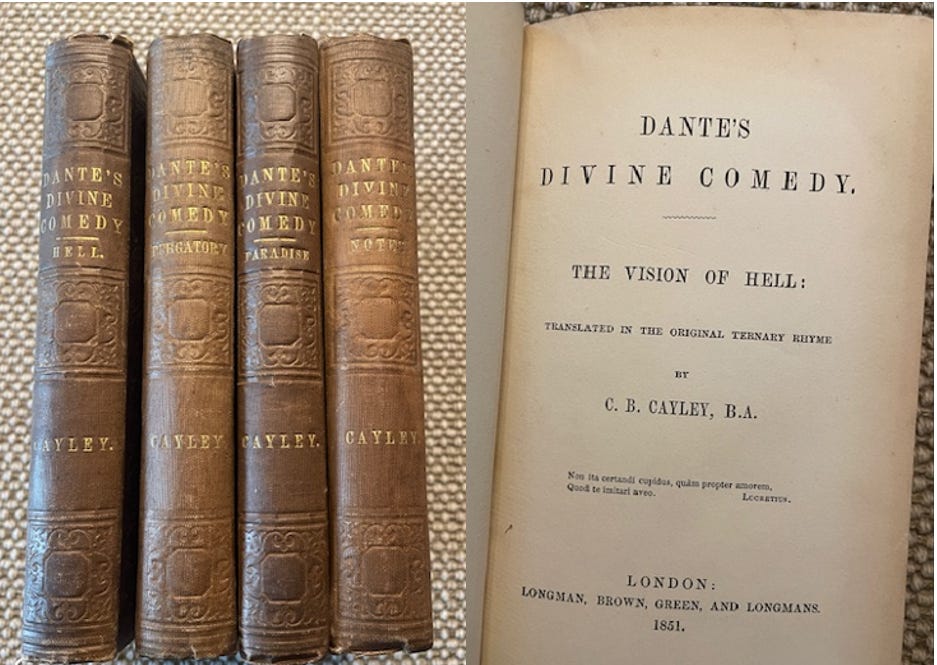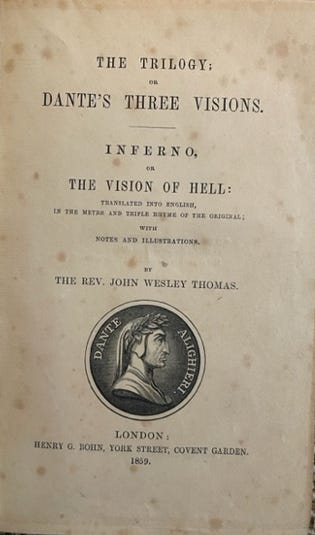There were nine translations published between 1850 and 1859. Five were published as one volume (three Comedy’s, two Inferno’s), a three volume Divine Comedy issued over a four year period, and another three volume Divine Comedy where only the first volume, the Inferno, was published in the decade. The last two volumes were published in the following decade. Here is the list:
1850 - Patrick Bannerman - Divine Comedy
1851 - Charles Bagot Cayley - Inferno, vol. 1*
1852 - Rev. Edmund O’Donnell - Divine Comedy
1853 - Charles Bagot Cayley - Purgatorio, vol. 2*
1854 - Thomas Brooksbank - Inferno
1854 - Charles Bagot Cayley - Paradiso, vol. 3*
1854 - William Frederick Pollock - Divine Comedy *
1859 - John Wesley Thomas - Inferno, vol. 1* (vols. 2 and 3 published 1862 and 1866)
1859 - Bruce Whyte - Inferno
Translations in my collection are marked with an asterisk. All pictures are from my collection. All titles are linked to PDF’s where available. This list does not include partial translations of which there were many.
1850 - Patrick Bannerman - Divine Comedy
In 1850, Patrick Bannerman published his lamentable translation of the Comedy of Dante Alighieri.1 This universally reviled translation is, to put it nicely, irregularly rhymed with no consistent verse pattern. The translation itself is said to “seldom get more than fifty percent of Dante’s meaning.”2 In fact, according to Gilbert Cunningham, one of the heavy hitters of Dante translation scholarship, Bannerman’s attempt is “in the running for … having produced the worst English translation of the Divine Comedy.”3 I would disagree with this. There are some truly horrendous translations, but the one’s I have in mind come after Cunningham’s time.
Luckily for Bannerman, no one has ever been able to identify who he is beyond his name. The only information gleaned came from the publishers, William Blackwood and Sons, Edinburgh, who stated that Bannerman himself covered the “entire cost of production … [and] they printed 528 copies … but no sales are recorded.”4
Be that as it may, I want a copy of this so bad. I just have to have one of the worst translations! No collection can really be complete without covering both ends of the spectrum; though, what’s the best translation? I don’t think we can get agreement on that.
1851-1854 - Charles Bagot Cayley - Divine Comedy
Between 1851 and 1854 Charles Bagot Cayley published his Divine Comedy.5 The Inferno was published in 1851, Purgatorio in 1853, and Paradiso in 1854. Cayley added a fourth volume in 1855 titled Dante’s Divine Comedy: Notes on the Translations.
Cayley was the first to translate the whole of the Divine Comedy in terza rima, though John Dayman gets the nod for the first to do a cantica, the Inferno, in 1843.
Interestingly, Cayley was a friend of the Rossetti family. He was a former pupil of Gabriele Pasquale Giuseppe Rossetti, an “Italian scholar, an expert on Dante, and professor of Italian at King's College, London”6 who also happened to be the father to the famous Rossetti clan: Dante Gabriel (artist), William Michael (translated the Inferno in 1865), Maria Francesca (wrote Shadow of Dante in 1871), and Christina Georgina (poet).
Through this connection he met and fell in love with Christina. In 1856 he asked for her hand in marriage. He “was refused … but became a lifelong friend.”7 In later years William Michael described Cayley “as the man she loved ‘deeply and permanently’ but refused to marry for religious reasons.”8 I wonder if Cayley tried his hand at translating Dante to impress and aid in trying to win the hand of Christina. We’ll never know for sure.
1852 - Rev. E. (Edmund) O’Donnell - Divine Comedy
In 1852 Rev. Edmund O’Donnell published Translation of the Divina Commedia by Dante Alighieri.9 It was the first prose translation of the entire Comedy. John Aitken Carlyle (1849) being the first of a cantica, the Inferno.
There is not a lot known about O’Donnell. Apparently, he was the first English speaking priest in the Augustinians of the Assumption, or “Assumptionists.10 This was an order founded in France by Fr. Emmanuel d'Alzon in 1845.11 O’Donnell is known within the order for his many translations, but interestingly, not for Dante. It is stated that “[a]fter, or before, settling down in Paris and before he became a Religious, he translated”12 the Divine Comedy. He did not join the Assumptionists until 1856, four years after the publication of his translation.
I have never seen a copy of this for sale, and like the other translations I am missing from this decade, it is high on my list.
1854 - Thomas Brooksbank - Inferno
Like Dayman and Cayley, Thomas Brooksbank translated the Inferno in terza rima. Published in 1854, the forward in his Dante’s Divine Comedy. The First Part. Hell, Translated in the Metre of the Original with Notes13 states that the “translating of the Part now presented occupied me a year and three-quarters.”14 He further goes on to say he has translated “in manuscript several Cantos of Purgatory.”15 I wonder if someone has the manuscript and doesn’t know it. Tag that for deep research.
Nope, never saw one for sale. Yup, still high on my dream finds.
1854 - William Frederick Pollock - Divine Comedy
William Frederick Pollock published a blank verse translation of the Divine Comedy: The Inferno, Purgatory, and Paradise16 in 1854. Sometimes the translations are so unremarkable that I have nothing to say about it.
This edition was illustrated by George Scharf where 31 of the 50 drawings are just reproductions of John Flaxman’s famous sketches. That’s something.
I just realized I haven’t been writing about the various illustrations that appear in the Divine Comedy. It is understandable because there weren’t any for quite some time. I will have to write about this later as a separate post, but for now I will give a brief synopsis. I did touch upon this in a bit more detail in my earlier post The CARY Conundrum.
The first illustrations to appear in an English translation of the the Comedy were in an 1845 publication (technically a bootleg) of a translation by Henry Francis Cary. It was a reprint of Cary’s single volume Divine Comedy, 1844, fourth edition, published by D. Appleton & Co. (New York/Philadelphia). It contained twelve of Flaxman’s designs.17
There is a lot I am leaving out. More later.
1859 - John Wesley Thomas - Inferno*, vol. 1 (vols. 2 and 3 published 1862 and 1866)
Between 1859 and 1866 John Wesley Thomas published the Divine Comedy. 1859 saw only the first volume, The Trilogy: or Dante’s Three Visions: Inferno, or the Vision of Hell. Like Dayman, Cayley, and Brooksbank, Thomas’ translation is in terza rima.
I love that in the Preface of this volume he shamelessly criticizes all the previous translations, though there were a couple he missed. He claims Boyd’s translation is a “loose and rambling paraphrase,”18 Pollock and Cary’s translations are “in blank verse, which can give the reader no idea of Dante’s music,”19 and Carlyle’s is “avowedly a mere prose version.”20 He almost said something nice about Wright’s translation, “though rhymed, has not the same kind of rhyme. [It is missing] that continuous and interchanging harmony … like a chime on the bells of eternity.”21 At the last he takes a vague stance when mentioning Dayman, Cayley, and Brooksbank, the other terza rima translations, claiming they have “their separate excellencies, as well as faults,”22 but does not go into specifics.
Of Thomas’ three volumes I am only missing his 1866 Paradiso. This translation was reprinted in 1910 in “The Finsbury Library,” and again in 1914 in the “Every Age Library.” Though I rarely collect anything besides first editions, I do happen to have the Finsbury set.
I don’t always write about revisions and reprints, but I think I will start adding them. Wish I thought of this sooner. Maybe I will go back and revise older posts.
1859 - Bruce Whyte - Inferno
The last of this decade is Bruce Whyte’s A Free Translation, in Verse, of the ‘Inferno’ of Dante.23 It was translated into a rhyme scheme of ABABAB. This is one of the variations sometimes referred to as bastard terza rima. In my opinion, it is a series of sestets with alternating rhyme with no stanza breaks, just continuous text. Not much to say about this one. It’s not very good. I’ll leave it at that.
I have never seen one to purchase for my collection. Like the others in this decade, it is high on my list.
Bannerman, Patrick. The Comedy of Dante Alighieri. Edinburgh, William Blackwood and Sons, 1850.
Cunningham, Gilbert F. The Divine Comedy in English, A Critical Bibliography, 1782-1900. Edinburgh and London: Oliver and Boyd, 1965, p. 84.
Ibid, p. 83.
Ibid.
Cayley, Charles Bagot. Dante’s Divine Comedy, The Vision of Hell. Four volumes. London, Longman, Brown, Green, and Longmans, 1851-55.
“Rossetti, Christina Georgina (1830–1894), Poet.” Oxford Dictionary of National Biography, 2024, www.oxforddnb.com/display/10.1093/ref:odnb/9780198614128.001.0001/odnb-9780198614128-e-24139. Accessed 19 Dec. 2024.
Ibid.
D’Amico, Diane. “Remembering Cayley: Christina Rossetti's “Dearest Friend.”” The Journal of Pre-Raphaelite Studies, Volume 22 Fall 2013, p. 63. Yorku.ca, 2014, jprs.apps01.yorku.ca/journal/volume-22-fall-2013/. Accessed 19 Dec. 2024.
O’Donnell, Edmund. Translation of the Divina Commedia of Dante Alighieri. London, Thomas Richardson and Son, 1852.
“Who Are We?” Assumptio.org, 2023, www.assumptio.org/en/who-are-we/father-emmanuel-d-alzon. Accessed 29 Dec. 2024.
Ibid.
“The Life of Fr. E. O’Donnell.” Assumptio.com, 2024, assumptio.com/about-us/virtual-library/47-virtual-library/576-the-life-of-fr-e-odonnell. Accessed 29 Dec. 2024.
Brooksbank, Thomas. Dante’s Divine Comedy, The First Part. Hell. London, John W. Parker and Son, 1854.
Ibid, p. vi.
Ibid.
Pollock, (William) Frederick. The Divine Comedy; or, The Inferno, Purgatory, and Paradise, of Dante Alighieri. London, Chapman and Hall, 1854.
King, Robert Wylie. “Parson Primrose”; the Life, Work and Friendships of Henry Francis Cary (1772-1844) Translator of Dante. New York, George H. Doran, 1925, p 284.
Thomas, John Wesley. The Trilogy; or Dante’s Three Visions. Inferno, or The Vision of Hell: Translated into English, in the Metre and Triple Rhyme of the Original; with Notes and Illustrations. London, Henry G. Bohn, 1859, p. vi.
Ibid.
Ibid.
ibid.
Ibid.
Whyte, Bruce. A Free Translation, in Verse, of the ‘Inferno’ of Dante with a Preliminary Discourse and Notes. London, Wright and Co., 1859.





